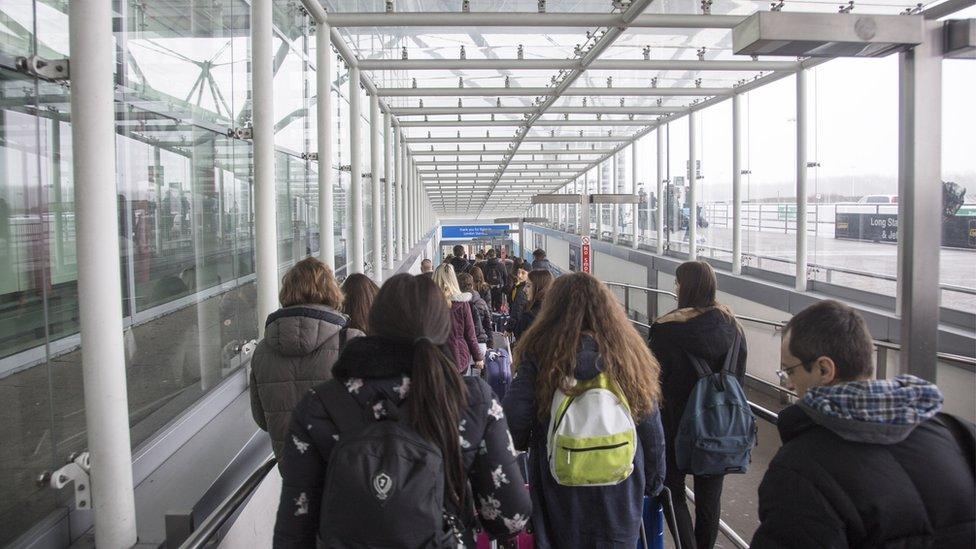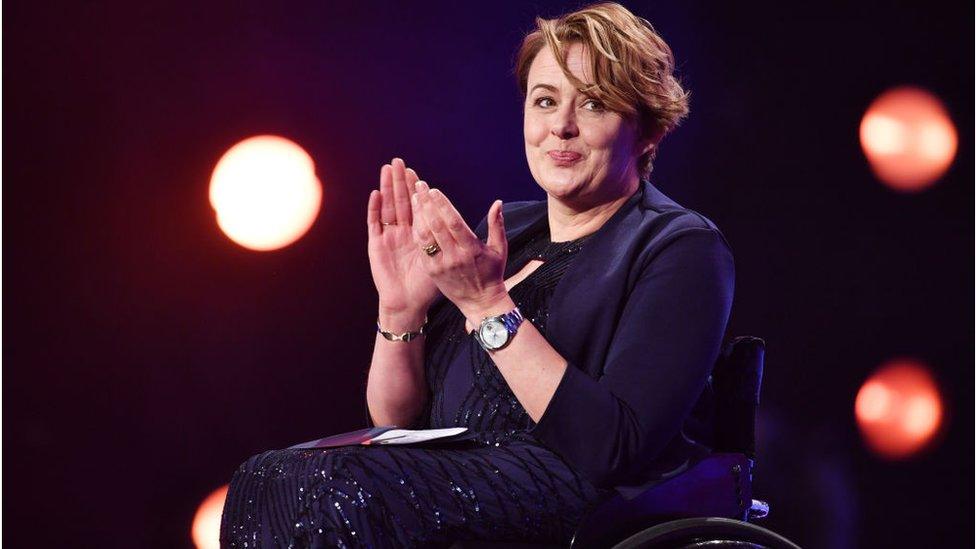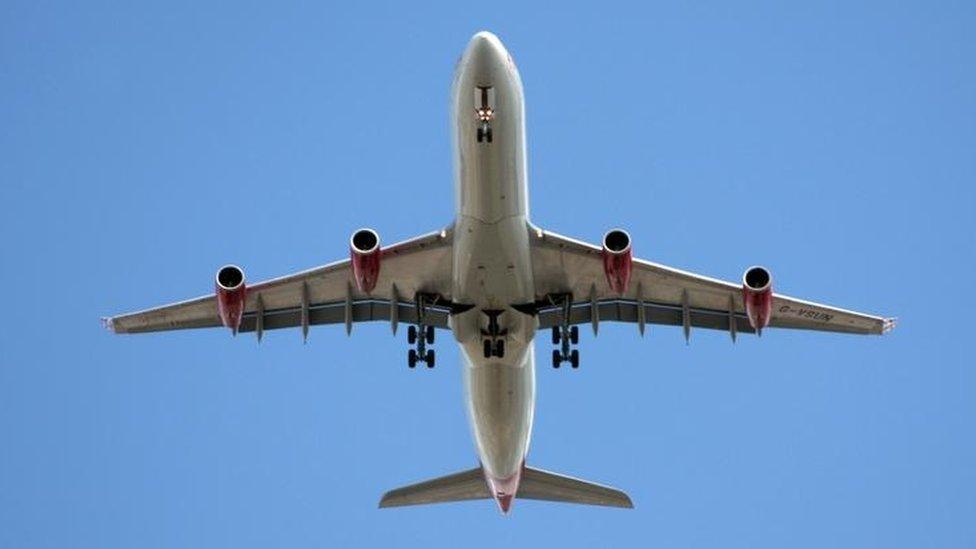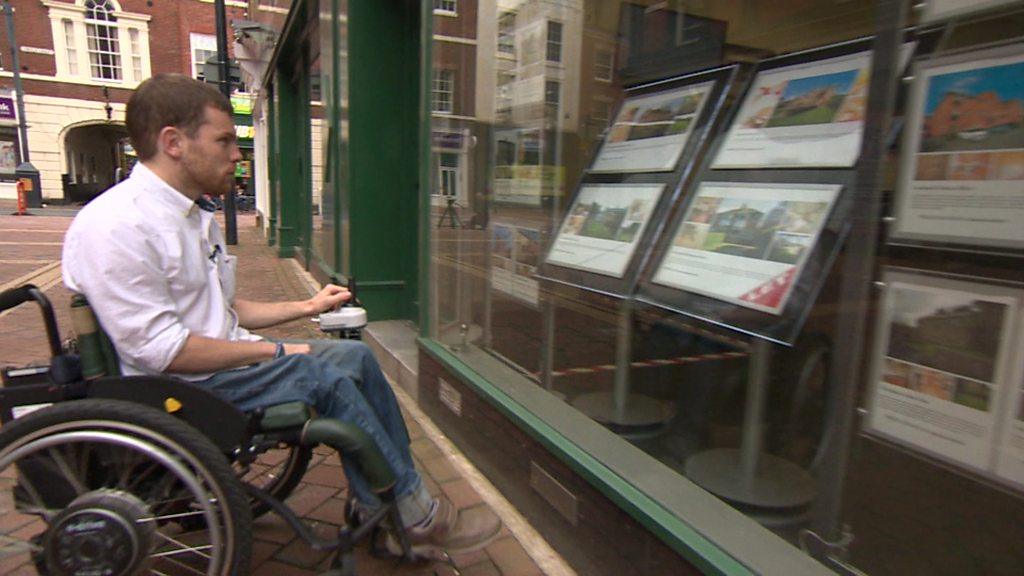Four airports found to be failing disabled passengers
- Published

Stansted is one airport that needs to improve its access for disabled passengers, the CAA found
Four of the UK's 30 biggest airports are falling short in providing access for disabled travellers, the Civil Aviation Authority has said.
Bottom of the list is Manchester, rated as "poor" for the second year running.
Birmingham and London Stansted airports are also in need of improvement, the CAA said.
London Gatwick airport, criticised by BBC journalist and wheelchair user Frank Gardner last year, is named as failing to meet expectations.
Mr Gardner has said airlines and airports take too long to help disabled passengers disembark from planes.
He has also criticised Heathrow for repeatedly losing his wheelchair and forcing him to stay on the plane for ages after everyone else has disembarked.
The CAA acknowledged that when things do go wrong, "the impact on individuals is significant", adding that there was still "more to do to improve journeys for disabled passengers and those with reduced mobility".
Inconsistency
Speaking to the BBC's Today programme, disability rights campaigner Baroness Tanni Grey-Thompson said: "Most of my inbox is full of complaints about trains or planes.
"The biggest complaint I get is inconsistency of service. You might fly out of an airport one week and get a great service, and it might be awful the next."
She added that "a lot of disabled people don't complain" because "you might spend most of your life complaining, so the true number [affected] might be more".

Baroness Grey-Thompson says many disabled people don't complain
Heathrow is now one of 10 airports listed as offering "good" access, having been considered "poor" last year.
"The passenger journey on arrival is now much quicker and generally seamless from aircraft to final point," the CAA said in its comments on the UK's busiest airport.
Sixteen of the UK's top 30 airports are rated "very good" for disability access by the CAA - 10 more than last year.
'Not acceptable'
The CAA said Manchester's problems centred on "long waiting times for assistance and issues with the recording and reporting of performance data".
In some cases, passengers had been left awaiting assistance for more than an hour, which the CAA said was "not an acceptable situation".
It said Manchester had acknowledged the problem and had implemented a performance improvement plan.
Disabled passenger Ted Stocker agrees that Manchester airport offered "atrocious" service to airline passengers with disability issues.
Mr Stocker has an electric wheelchair but it is not made available to him after landing until he reaches the baggage carousel, which means he requires an airport wheelchair to leave the plane. Problems occurred recently for him at Manchester, he said, when air bridges were not in use.
"An air ambulance was required to allow safe disembarkation. This went to the wrong aircraft. The net result was we were kept on the aircraft for 45 minutes," Mr Stocker said.
"The crew for the next flight were on board."
Mr Stocker believes the root cause of the inconsistent service offered to disabled passengers at the airport was "a lack of staff".
"I have written to both Manchester airport and [airport services provider] OCS over the last two years. Both have promised improvements but the service has deteriorated from poor to atrocious over this period".

Gatwick, Stansted and Birmingham had been marked down for failing to provide sufficient information about their standards of service, the CAA said.
"In addition, for Stansted, we have concerns about potential delays to passengers' journeys on arrival from inbound flights."
All three airports were taking action to remedy these problems, the report said.
The CAA said there were now more than three million requests for disability assistance at UK airports annually - a rise of nearly 80% since 2010.
In all, 83% of people requesting assistance said they were satisfied with the help they received, while 54% were very satisfied.
"The vast majority of passengers' journeys go smoothly and disabled passengers should have even more confidence to travel from UK airports," the CAA said.
- Published11 May 2018

- Published24 March 2018

- Published9 January 2017
